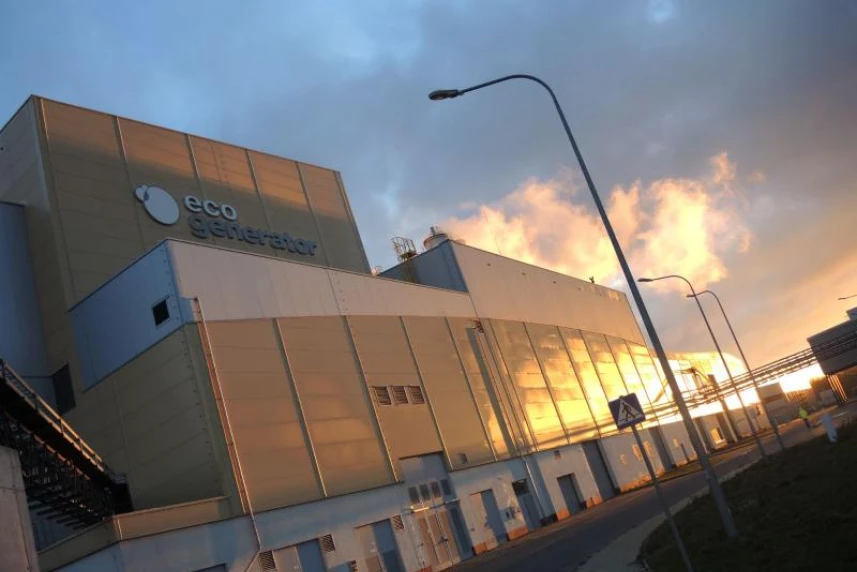EcoGenerator: every year is another step forward
Marta Kufel

How much energy did it produce? How much waste did it collect? What profits has it made and how much does it still need to pay back? EcoGenerator summarises four years of its activities.
The EcoGenerator had to start up before it could operate at full capacity. In the first year of its operation, the incinerator received over 114 thousand tonnes of waste for disposal. The waste was delivered to the plant in over 7.5 thousand deliveries. After the difficult first few years, the plant reached its nominal capacity in 2020 - 150,000 tonnes of waste per year. During this time it accepted over 93,000 tonnes of waste from the Szczecin City Municipality. The new integrated permit issued in October 2021 made it possible to increase capacity and dispose of even more waste. After four years, EcoGenerator ended the year 2021 with more than 156 thousand tonnes of waste accepted, while vehicles with transport appeared at Logistyczna Street more than 13 thousand times.
The incinerator is driven by waste
The primary source of revenue for Zakład Unieszkodliwiania Odpadów Sp. z o.o. is the fee paid by waste suppliers. This is the so-called “gate fee”, which accounts for slightly more than half of the Company's total revenues. EcoGenerator also earns money on sales of by-products of waste incineration, i.e. heat energy and electricity, which go to thousands of households. After deducting the energy used for the incinerator, in 2021 the plant sold more than 677,000 GJ of heat energy and almost 55,000 MWh. Marginal revenues are those from the sale of scrap metal recovered from incinerated waste.
In 2022, a significant increase in the price of electricity will most likely make its sale much more profitable than that of thermal energy, while the opposite was true in 2021. This means that it is likely that the profit from accepting waste for disposal will be about 53 per cent of revenue, electricity sales about 27 per cent, and heat sales about 20 per cent.
It is worth noting that about 80 per cent of the waste for which the so-called “gate fee” is charged represents waste accepted under the so-called contract of assignment, where the price for its acceptance covers only operating costs. This reduces the cost of waste management in the area covered by the entrustment agreements and translates into lower waste collection charges for residents of that area. For the remaining 20 per cent of waste, the price results from individual negotiations with suppliers.
"The decision to build the waste incinerator was carefully considered. We have actually achieved all the assumed results. There are numerous benefits from modern waste treatment,” emphasises Piotr Krzystek, the Mayor of Szczecin. “Especially nowadays, when apart from ecological requirements, the city’s operating costs are also significant. After all, this translates into residents' budgets. Without waste incineration plants, our bills would be much higher. At the same time, our EcoGenerator burns waste and, what is important, produces electricity and heat. In this way, we increase the energy security of the residents. In hindsight, we can see that the decision to build it was definitely appropriate.”
During its four years of operation, EcoGenerator has produced over 2.1 million GJ of heat. In 2021 alone, this was over 687 thousand GJ. On the other hand, the electricity produced from 2018 to 2021 reached over 311 thousand MWh. The year 2021 alone was closed with a result of over 76 thousand 700 MWh.
Liabilities paid on schedule
The primary source of Zakład Unieszkodliwiania Odpadów liabilities, apart from current costs, are payments related to servicing the bonds issued by the Company, which were the source of financing for the construction of the incinerator.
“On average, payments of capital instalments amount to PLN 28 million and interest payments to PLN 9-10 million, with a downward tendency year on year,” says Daniel Śliwiński, Finance Director at ZUO. “All contractual obligations are settled according to the due date.”
The largest costs to be borne by the plant are generated by depreciation charges, followed by salaries and surcharges, then the cost of annual maintenance, the cost of post-processing waste disposal – including slag and ash, and the cost of chemical reagents.
More information about the EcoGenerator and photos can be found at www.ecogenerator.eu, on its Facebook and Instagram profile.